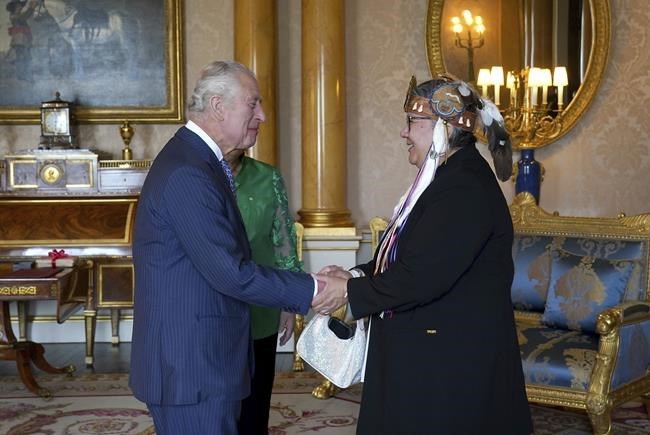LONDON — A delegation of Indigenous leaders from Canada met with King Charles III on Thursday, where they talked about reconciliation and the need to build a strong relationship going forward.
Assembly of First Nations National Chief RoseAnne Archibald, Inuit Tapiriit Kanatami President Natan Obed and Métis National Council President Cassidy Caron had an audience at Buckingham Palace, just two days before the King’s coronation on Saturday.
Archibald said the meeting was a chance to "evolve the relationship with the Crown," which predates confederation.
“One of the issues that is important to us is that nation-to-nation relationship that we have had and continue to have,” she said, adding that the meeting was “very positive.”
“It was also an opportunity for us to connect to the King on things that matter to him, things that also matter to us and that we can work together on.”
Obed said the leaders were also able to talk about the issues facing their communities, and all three of them invited the King to visit Canada to continue the work of reconciliation.
As prince of Wales, King Charles spoke often of the importance of reconciliation with Indigenous people, which was one of the priorities of his three-day visit to Canada last year. In a closing speech in Yellowknife, the King said he had been “deeply moved” by the stories of residential school survivors he’d met, and publicly acknowledged their suffering.
Many Indigenous leaders have urged the monarchy to go further in addressing the harms of Canada’s colonial legacy, and Archibald is among those who has previously called for an apology.
But the three leaders all said that Thursday’s meeting was about establishing a positive relationship, and that the tougher conversations will come later.
Obed said the relationship moving forward will include both easier parts, such as agreements to promote Indigenous arts and culture, and more difficult ones.
“The challenges around the colonial history and a lot of the associated issues with that, I don't think that the King has thought that those aren't going to be on the table," he said. "But certainly we will have to proceed as best we can in light of the real limitations that all of us have in doing things for our respective institutions."
Archibald said the meeting wasn’t the right time to raise the issue of an apology, but rather a chance to set the groundwork for the future. She said the leaders hope to meet with the King again, both virtually and during an eventual in-person visit.
Caron agreed, adding that she didn’t believe the meeting was merely symbolic.
“To be able to sit down as First Nations, Métis and Inuit and share with him who we are and what our priorities are as a people, and identify the ways that we can work together into the future, is really important to us,” she said.
She said the fact that King Charles made time for the meeting only two days before the coronation was “sincerely meaningful,” and bodes well for a future relationship.
Other Indigenous leaders have also travelled to London for the coronation events, including several grand chiefs from Manitoba.
Manitoba Keewatinowi Okimakanak Grand Chief Garrison Settee and Assembly of Manitoba Chiefs Grand Chief Cathy Merrick said in a joint interview that they've come in part to remind the King of his treaty relationship with Canada's Indigenous people.
“We’re here to remind the new King that he has to restore that relationship he had with Indigenous people because we didn’t sign treaties with Canada, we signed treaties with the Crown," Settee said.
He said the relationship between the Crown and Indigenous people dates back to the Royal Proclamation of 1763, which viewed the association as a nation-to-nation one. However, he said that changed over time as Indigenous people started to be treated as “wards” rather than partners, resulting in poverty, marginalization and broken treaty promises.
“This is something the monarchy needs to address because the relationship we’ve had has not been a very good relationship,” he said.
He would like to see the King take concrete steps, including refuting the Doctrine of Discovery, which was used to legitimize the seizure of Indigenous land, and make a new proclamation to complement the one made in 1763, which would reaffirm the recognition of Indigenous nationhood.
Merrick said she’d like to see the Crown follow up with its representatives in Canada to help move forward priorities such as the return of land, resource revenue sharing and a new Indigenous citizenship system.
She also believes the King should apologize.
“I believe an apology should be said in terms of how our people were treated and in terms of giving that authority to Canada to treat the way they treated our people," she said. However, she added that the chiefs’ presence in London is a gesture of goodwill.
“Today we’re moving forward,” she said. “We’re very happy we’re able to be here to celebrate him becoming King, so hopefully that relationship begins moving forward.”
This report by The Canadian Press was first published May 4, 2023.
Morgan Lowrie, The Canadian Press
